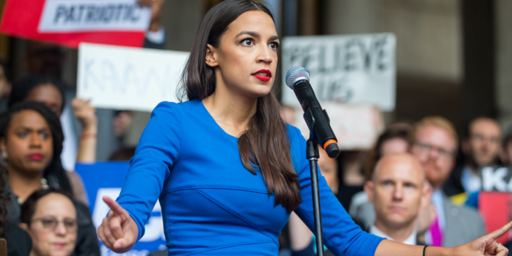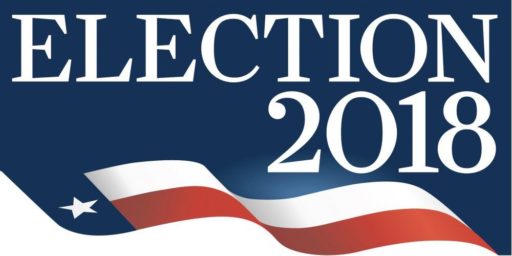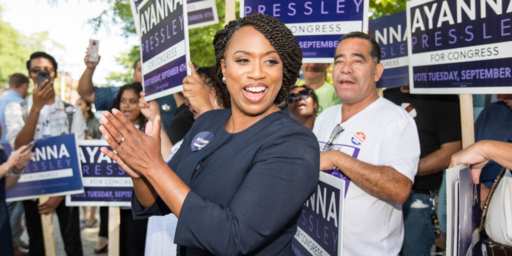The Democratic Party’s Progressive Wing Falls Short
Tuesday's election results were a defeat for the progressive effort to remake the Democratic Party in their image.

The Washington Post’s David Weigel looks at the results of Tuesday’s primaries, which took place largely in the Midwest, and argues that on the Democratic side the results show the limits of the “progressive” politics of politicians such as Bernie Sanders and Elizabeth Warren:
The Democratic Party’s left-wing insurgency found its limits Tuesday night, with voters favoring establishment candidates over more liberal challengers in almost every closely watched race across several states.
In Michigan, former state senator Gretchen Whitmer easily won the Democratic nomination for governor over Abdul El-Sayed, a doctor backed by Sen. Bernie Sanders (I-Vt.) who was vying to become the country’s first Muslim governor.
In suburban House districts across the Midwest, left-wing candidates lost to Democrats backed by party leaders, abortion rights groups and labor unions.
And in St. Louis, where party giant-slayer Alexandria Ocasio-Cortez traveled to help another young insurgent candidate topple an incumbent, Rep. William Lacy Clay (D-Mo.) cruised to an easy primary win over challenger Cori Bush.
Six weeks after Ocasio-Cortez stunned Rep. Joseph Crowley (D-N.Y.), signs of a tea-party-like movement in the Democratic Party that would throw winnable races to far-left candidates appear to be fading. Instead, the party’s establishment has embraced ideas like expanding the Affordable Care Act, shrinking the space between its leaders and its disrupters.
“Trump has been the great doctor, stitching up our scars and healing us organically,” said Washington Gov. Jay Inslee, chairman of the Democratic Governors Association.
The party’s centrists, who had bemoaned Crowley’s defeat, saw Tuesday night as a turning point. Whitmer, who ran on her record of expanding Medicaid in Michigan — and a memorable promise to “fix the damn roads” — will now lead an all-female ticket in a swing state that Hillary Clinton narrowly lost.
Candidates backed by Emily’s List, which endorses women and sometimes clashes with the left, bested left-wing challengers in three southeast Michigan districts; at least two are seen as toss-ups in November.
And in Kansas’s 3rd Congressional District, Brent Welder, a Sanders-backed labor lawyer who was viewed as the most liberal candidate in the race, was bested by attorney Sharice Davids, whose win Tuesday night makes her the state’s first gay and Native American congressional nominee.
“This is a fantastic night for centrist Democrats,” said Jim Kessler, senior vice president for policy at the center-left Third Way think tank. “We nominated the right candidates who can win House seats and governor’s mansions for the Democratic Party. There’s a quiet enthusiasm in the middle. There’s a quiet voice that people are not hearing in the media, but it’s loud at the ballot box.”
David Siders at Politico argues that Tuesday’s results lay plain the limited appeal of the Bernie Sanders version of Democratic politics and Bill Scher at Politico points to Tuesday as evidence that the “progressive” wing of the Democratic Party needs to learn a lesson in political reality:
Tuesday night’s largely Midwest primaries produced a near-shutout for the anti-establishment left. Ocasio-Cortez partnered with Bernie Sanders to make a series of splashy endorsements that, in the end, failed to clinch victories. And two leftist upstarts hoping to emulate Ocasio-Cortez, and defeat longtime Democratic incumbents, fell far short.
he most glaring defeat came in Michigan’s gubernatorial primary. This is the state where Sanders defied the polls and edged out Hillary Clinton, raising hopes that he had a magic touch in the Rust Belt. Sanders and Ocasio-Cortez tried to catapult the young and brash newcomer Abdul El-Sayed, who trailed in polls, endorsements and money to former state Senate Democratic leader Gretchen Whitmer. They could only nudge him up to second place, with 30 percent of the vote.
In fact, Clinton’s endorsement appeared to carry the most weight in Michigan. Her late robocall in support of Haley Stevens helped take Stevens from second place in polls to an election night victory in the suburban 11th District, a top Democratic target, while Fayrouz Saad, backed by Ocasio-Cortez, placed fourth. In two other House primaries in Michigan, candidates backed by the party’s official campaign arm, the Democratic Congressional Campaign Committee, coasted against supporters of Sanders’ signature Medicare for All proposal.
El-Sayed’s defeat may have been the most noticeable loss for Ocasio-Cortez and Sanders, but the defeat of Brent Welder in Kansas is far more politically significant. Welder, a former Sanders 2016 campaign staffer, hoped to carry the Democratic banner in Kansas’ 3rd Congressional District. The largely urban district is a top party priority, one of a handful of Republican-held seats that Clinton won in 2016.
(…)
Targeted Democratic incumbents easily survived challengers who hoped to be the next Ocasio-Cortez and who were endorsed by the anti-establishment Justice Dems. In Washington state’s “top-two” primary, Susan Smith received less than half the votes of Rep. Adam Smith and failed to make the cut. And in Missouri’s 1st Congressional District, Rep. William Lacy Clay defeated Cori Bush by 20 points. While the remaining Democratic incumbents still facing primaries this year shouldn’t get caught napping like Crowley, nor do they have to fear that the Democratic Party is gripped with a fever to throw all the bums out.
(…)
The Democratic Party is more liberal than it was 15 years ago, and there’s no question that shift is partly due to an increasingly vocal, confident, confrontational democratic socialist faction. But it is still only a faction. Most Democratic nominees in competitive House races—not to mention incumbent Senate Democrats fighting for their political lives in red states—are not embracing single-payer or calling for the abolishment of ICE. They are mostly calling for improvements of the Affordable Care Act and a pathway to citizenship for the undocumented.
“There is no district too red for us to flip,” Ocasio-Cortez declared in a recent speech. Given how close Danny O’Connor came to winning the special election in Ohio’s 12th District, she’s probably right. But her platform doesn’t seem like the path to Democratic victories in red districts, based on Tuesday’s results. In the places where democratic socialists are making their biggest inroads, the hue is blue.
While the ongoing battle between the Sanders-inspired “progressive” wing of the Democratic party and more mainstream forces inside the party certainly played a role in what happened on Tuesday, the broader reality is that these results are simply an example of the fact that there is no one size fits all template for winning elections nationwide. The kind of candidates that resonate in the type of urban districts that have produced Democrats like Ocasio-Cortez are very different from the vast majority of the districts that Democrats will need to win in order to gain control of the House in November, and to hold on to that control in 2020 and beyond if they do manage to gain control this year. Indeed, given the outcome of many of these primary elections it seems clear that Democrats nationwide are not united when it comes to the supposed triumph of the “progressive” wing of the party. Instead, Midwestern Democrats in particular appear to be the same kind of generally middle of the road voters that they have been since they became “Reagan Democrats” in 1980 and 1984. If the Democrats are going to win elections in this part of the country, it isn’t going to be with carbon copies of Ocasio-Cortez. It’s going to be with candidates like Joe Donnelly, Joe Manchin, and Heidi Heitkamp who, while they are generally Democrats at heart also reflect the most centrist positions that can win in their states. Supporters of people like Sanders and Ocasio-Cortez are either unable to unwilling to realize this fact, and thus they suffered big losses on Tuesday.
Fortunately for Democrats as a whole, the national party as a whole and the parties on the state level are far more level-headed than the people pushing people like Ocasio-Cortez, Sanders, and other so-called “progressives” as the example of the direction that the party should be headed. In this respect, at least, Democrats appear to be responding in a more intelligent way to their rebellion on the left than Republicans did to the uprising on the right that started in the 1990s, culminated in the Tea Party, and ultimately led to the nomination of Donald Trump. For Republicans, ideological purity came to be the name of the game to the point where the Northeast, which had once been a Republican stronghold, was instead a Republican desert. That has changed in recent years as some national Republicans came to recognize that candidates who can win in the south aren’t exactly going to fare well in New Jersey, New York, or New England. The result in recent years has been something of a rebirth of the Northeastern Republican in the form of politicians such as Governors Larry Hogan, Chris Christie, George Pataki, and Charlie Baker. On Tuesday, Democrats learned that candidates that play well in the Bronx aren’t going to play well in Kansas. Unless they learn that lesson they could find whatever success they have in November thanks to voter blowback against President Trump could prove to be short-lived.




I think Obamacare, with subsidies and Medicaid, has a shot at being better than Medicare for All. But I’m not inclined to duke it out.
What I think we learned from the Sanders campaign, as well as from the Trump campaign, is that people want big ideas and simple messages. Voters want to see the candidate’s feelings, and engage with them emotionally. “Fix the damn roads” is a fine example, actually.
The game is rigged. It’s rigged for the 1 percent. We can take that message away from Trump.
Perhaps this is a consequence of being more educated.
Should Democrats move left? Or should Democrats claim the middle abandoned by Republicans? As with many political dichotomies, the answer is both. They can be a big tent.
Another example is the MI 8th district where Chris Smith, a MSU professor who had Ocasio-Cortez stumping for him was trounced by Elissa Slotkin by a 70-30 split.
Notwithstanding this, I suspect the future of the party and, I suspect, the US more broadly, is a more socialist worldview. An argument could be made that with Brexit in the UK, and the Trump meltdown in the US, what we are seeing is not a resurgent right, but the death throes of a discredited ideology.
Interesting numbers from Pew on the 2016 electorate, showing the percentage of both candidate’s support that came from age groups:
Age 18 to 29: 8% T 16% H 13% of Total
Age 30 to 49: 27%T 32%H 30% of Total
Age 50 to 64: 33%T 27%H 29% of Total
Age 65+: 32%T 25%H 27% of total
The youngest cohort went 2 to 1 for Hillary. The next cohort Hillary won by 5 points. Trump carried the 50-64 group by 6 and the Medicare demo by 7. That is not an encouraging picture of the future for Republicans. Trump is loved best by people who’ll be dead relatively soon, and hated hardest by young people.
Things like UBI and Medicare for all are popular with the yoots; things like guns, racism, misogyny and nativism not so much. Young people are in effect the causes of, the proponents of, the diversity that causes such panic amongst the Trumpaloons. They have no nostalgia for the 1950’s, if anything their nostalgia will be shaped around the Obama era.
From the article
Doug’s analysis
If the progressive wing is nudging the mainstream of the party to the left, that’s really a greater success than electing a few gadflies. We need gadflies too — they’re the ones who shout “abolish ICE” and make “seriously reconsider the priorities and implementation details of ICE” a reasonable middle of the road position — but Occasio-Cortez should do nicely.
We’re at a spot where the CFPB is considered radical, despite it basically being “regulate banking so the little people don’t get completely screwed”. I’m ok with a process that moves things a bit to the left, even if it doesn’t elect the left-most politicians everywhere.
@teve tory: Partially. But a big reason why there isn’t going to be a Tea Party left is due to Obama having a relatively successful presidency. That is one aspect that always gets left out when people talk about the Tea Party. A big reason they were able to take over the GOP was because GWB’s administration was a discredited train wreck and party establishment lost credibility with the GOP base.
That has never been the case with the Democratic base, no matter what Sanders and his cohorts try to say. Obama was/is massively popular with the Democratic base and they want candidates like him and not Sanders, which you are seeing in the primaries.
For all the bashing of Ocasio-Cortez, she does ask the right questions…why is there plenty of money for tax cuts for the wealthy and for wars all over the globe but not for Medicare for All…
As a person, I find the progressive wing’s policies for the most part appealing. As a finance professional, I find that many of the policies are completely unrealistic on a financial basis. Often when the progressives (Bernie Sanders for example) discuss paying for these policies the financial backup uses nonsensical assumptions, especially in the out years.
Of course the GOP, the supposed fiscally responsible party, is actually quite responsible – their decades of unfunded tax cuts makes them ultimately responsible for most of the $20+ trillion national debt.
the national debt increased by about $8+ trillion under Obama, but about 85% of that was from the Bush tax cuts and other Bush policies (such as Medicare Part D, which passed under Bush and was, of course, unfunded). The Democrats may be the party of tax and spend, nut the Republicans have been the party of borrow and spend since the days of Reagan.
A conundrum of polling is that majorities describe themselves as ‘conservative’ but that ‘liberal’ sides of specific issues poll remarkably well. Things like ‘having a right to health care’ or ‘livable minimum wage’ or ‘is immigration good or bad for the U.S.’ almost always lead to ‘left’ preference. A good article about this:
http://www.nationalmemo.com/americans-really-believe/
As to the losses suffered by the progressive Dems — I think 24% success is the final score — sounds like a pretty strong showing when you consider the elections we’re looking at were in western PA, mid-OH or (forgodsake) Kansas.
@JohnMcC: I stumbled across a poli sci paper years ago that argued many people who call themselves conservative aren’t. They’re conservative in their personal behavior, they came from a conservative religion, Republican messaging has made conservative sound good, so they believe themselves to be conservative. But politically they aren’t. When pundits harp about a center-right nation, they’re repeating polls they don’t really understand where people self identify as conservative. But what these polls really show is that most people don’t pay a lot of attention to politics and don’t really understand the political definitions of liberal and conservative.
The other phenomenon they identify is that they see talking heads spouting conservative philosophy they like and others talking about liberal policy they like (’cause the last thing conservatives want to do is talk policy) and they’re not sophisticated enough to realize these are opposite sides talking.
This is true and a big issue has been that both parties think the electorate is more conservative then it really is and it has an impact on the way they govern.
Must be something of a trend here. There’s an article up at theatlantic – dot – com contending that the leftward progress of the D-party has been pretty darn quick and has been accelerated by the Trump phenomenon. Sounds right to me; who would’ve thought that ‘single-payer’ and/or ‘medicare-for-all would sound so — ahem — reasonable only two years after it seemed that ObamaCare appeared doomed?
‘Trump Made Socialism Great Again’ by Shadi Hamid who is a Brookings scholar.
@Michael Reynolds: You may be forgetting something–UBI and National Health were popular with our generation, too, until we started making significant money. You came to that part of the game late and with spectacular success, so YMMV.
ETA: Dennis Leary (I think) put it well in noting that when he became successful, he started being more concerned about keeping his wealth and less concerned about his fellow man.
@Yank: Basically, people are in favor of good well funded schools, a good public health system that takes care of everybody, good roads, strong defense, and not paying taxes. Successful holders of office include all of the above in their pitch–especially the last one if they are GOP.
@Michael Reynolds:
It’s easy to be for UBI and Medicare for all when you’re not paying for them. While I think both ideas are good in theory, I’ve yet to see a realistic plan for paying for either.
i.e. in 2017, Medicare spent 7.9% of GDP covering 15% of the population. That simply does not scale.
As a liberal Miseryan my political preferences are far closer to Elizabeth Warren than they are to Claire McCaskill. But if an Elizabeth W were to run against Claire M to be one of the Senators from Misery, I would still vote for Claire every time. Why? Because Elizabeth Warren could never win here and Claire can.
@Stormy Dragon:
England, Canada, and Spain all have “Medicare for all” systems and manage to pay for them. All of Western Europe have national healthcare systems of varying types and manage to pay for them. Hell so does Costa Rica (and I think Uruguay). There are probably others.
Paying for it is not the problem. Getting the various stake holders to accept a slice of a smaller pie is.
@Stormy Dragon: It is the most expensive 15% of the population, so I would need a lot more than that datapoint to say that it wouldn’t scale.
We pay a fvcking crap-ton for health care in this country, and have mediocre results overall. If we can capture that money in taxes, and redistribute it, we can get universal health care for less. The money is there.
The path to get that money and rework 15% of our economy is unclear, but as a country we are already spending the money. But, before you can figure out how to get somewhere, you have to figure out where you’re going.
@Gustopher: Exactly. “Why would we spend 32 billion to save 2 billion?” Why is it so hard for people to realize this wouldn’t be new spending, just different labels on existing spending, and greater efficiency?
@JohnMcC: @gVOR08:
You are describing the voters here in MO. “Vote NO on Prop A” lawn signs were sprouting up like weeds all around the hills and hollers and Right to Work went down by almost a 2-1 margin. Yet I can guarantee that come November a large percentage of them will pull the handle for the same damn Republicans who rammed the RtW law thru the lege for Gov Bondage Kit to sign last year because of Guns and Jesus.
And they will all act shocked, shocked I tell you, when those same Republican lawmakers turn around and do it again in 4 (or 6 or 8 or…) years.
@Gustopher:
Yes, but the process of doing that requires major structural changes. If that’s what the “medicare for all people” actually mean, then the slogan is really a crap description of their actual policy goal.
I also think the “we can get universal coverage for less” is basically a GOP “fraud and waste” style handwave. What are you proposing be cut? Pay doctors and nurses less? Close hospitals and practices? Buy less equipment?
@Just nutha ignint cracker:
Wealth is all relative and you may be optimistic in assuming significant numbers of younger cohorts will become richer relative to the Boomers. These poor bastards will be paying our medical bills and our social security from a smaller and smaller base. And they’ll still be neck deep in the debt we’ve run up, then will have to cope with climate change and a decayed infrastructure. I think we’ve got some socialism coming.
The flip side is that at the top end wealth is also relative. There’s no real difference between Rockefeller’s tens of millions and Bezos’ tens of billions. As long as the 1% gets screwed equally within its group I suspect there would be less push back than people might expect.
@OzarkHillbilly:
Boom!
@OzarkHillbilly:
Most countries that have single payer have cost controls that would be politically unacceptable in Medicare. Hospital costs would be a large problem(In Brazil it took years to create a single payer system, from a system that was basically Medicare for all – only people that paid for the Social Security system were covered. States and municipalities are required by law to fund public healthcare).
There is some difference between single payer and Medicare for all, and it would take sometime to implement single payer.
@Stormy Dragon: “i.e. in 2017, Medicare spent 7.9% of GDP covering 15% of the population. That simply does not scale.”
Medicare covers the highest-cost segment of the population (save for tiny niche segments, such as a preemies).
@Barry:
This is somewhat circular though, as part of why they’re the highest-cost segment is because they’re all covered. People under 65 who get expensive to treat conditions are cheaper because a big chunk of them go untreated and die.
@gVOR08: How many people work in health insurance? We don’t need nearly that number.
(To avoid an increase in unemployment, I propose feeding them into a woodchipper. This will also reduce health care expenditures)
(Proposal is a work in progress — such as how to restructure a large chunk of our economy, and how to get to that restructured state, and how to reduce bad consequences. I am just saying that the money is there, but we are currently using it badly)
@Gustopher:
Because obviously this new medicare for all system is going to magically run on its own without any government customer service, administration, etc. employees managing it.
And even if we could eliminate all of the insurance overhead, yes thats $200 million saved, but it’s also about 6% of healthcare spending, so it hardly makes a dent in the in the “why do we spend so much more than other countries” problem.
So now you’ve gone from the equivalent of GOP “waste and fraud” hand waving to the equivlent of GOP “defund NPR” handwaving.
@Gustopher:
And seriously, all 2.6 million Americans who work for health insurance companies deserve to be slowly tortured to death?
Noted just now that a post that spoke of ‘Progressive Wing’ ideas has led to a thread that focuses almost entirely on health care.
Hmmmm…..